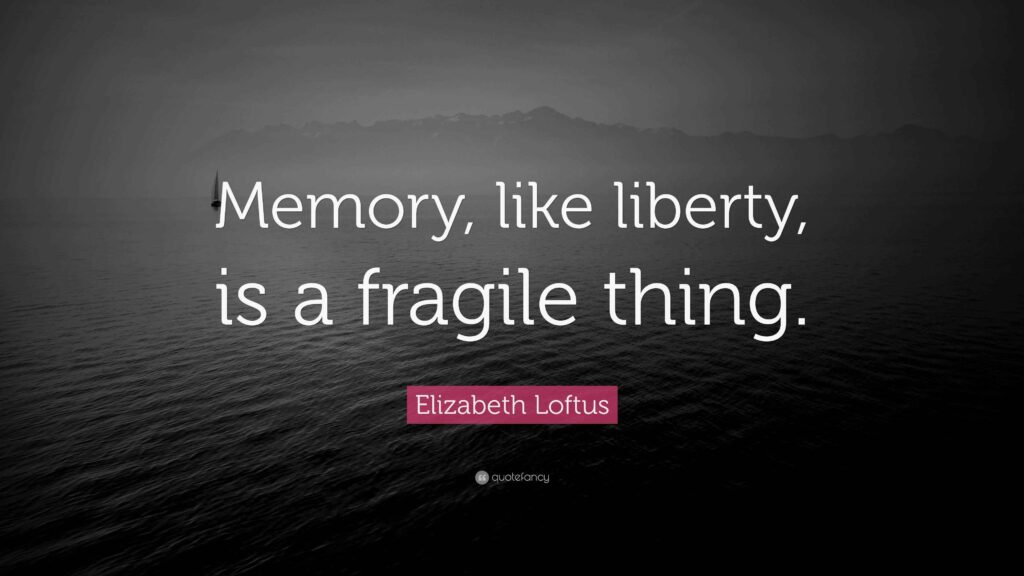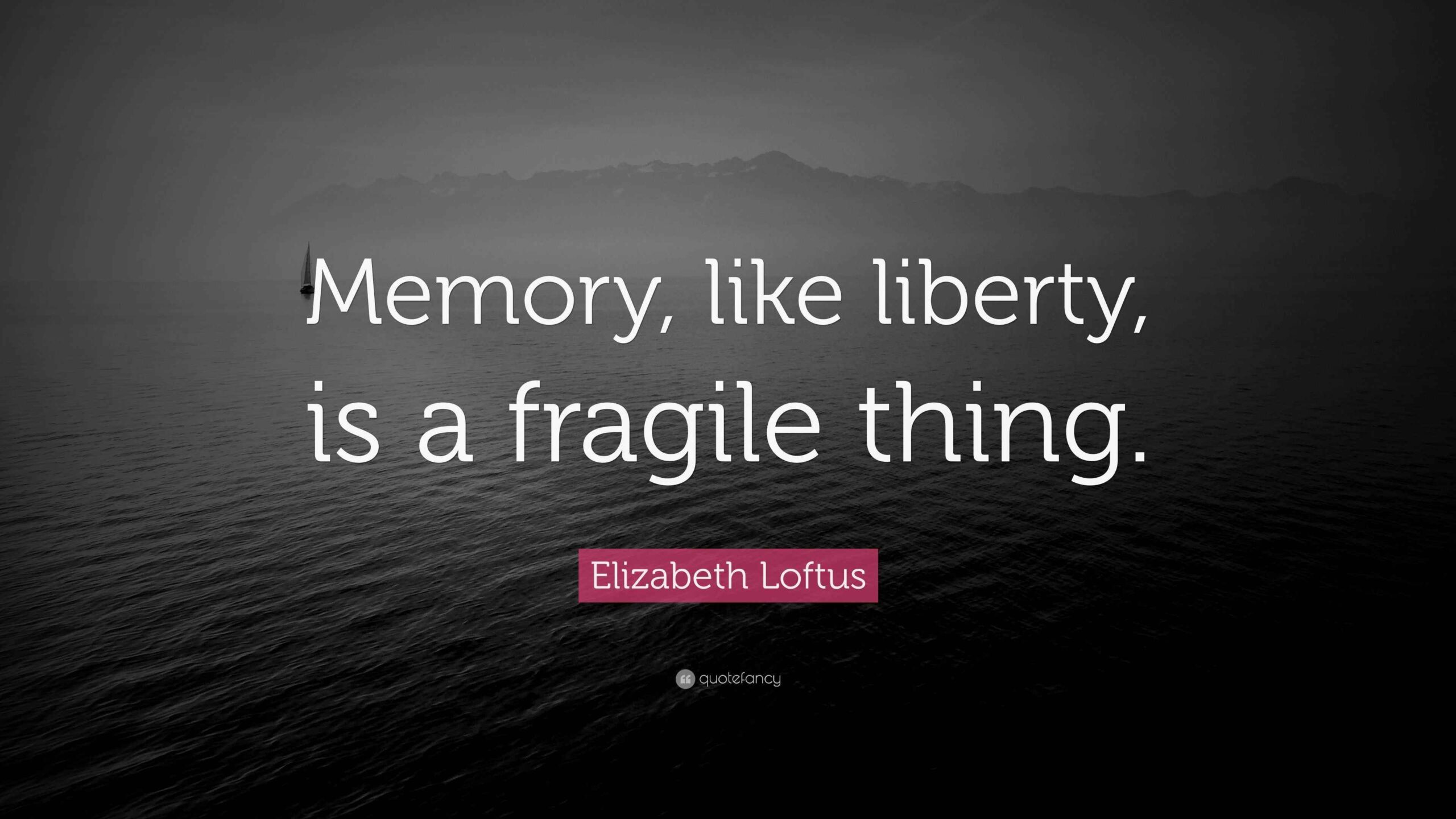
Unpacking the Power of Memory: Exploring Elizabeth Loftus Quotes and Her Groundbreaking Research
Dr. Elizabeth Loftus, a name synonymous with the study of human memory, has profoundly shaped our understanding of how we remember the past. Her research, often controversial, has illuminated the fallibility of memory and the ease with which it can be manipulated. This article delves into the core of Dr. Loftus’s work, exploring some of her most impactful quotes and the implications of her findings for law, psychology, and everyday life. The focus is on the profound impact of **Elizabeth Loftus quotes** and the legacy of her research.
Dr. Loftus, a distinguished professor of psychology and criminology, has dedicated her career to unraveling the complexities of human memory. Her work has revolutionized the field, challenging long-held assumptions about the accuracy and reliability of our recollections. The **Elizabeth Loftus quotes** highlighted below provide insight into her core beliefs and the groundbreaking nature of her research.
The Malleable Nature of Memory: A Foundation of Loftus’s Work
One of the central tenets of Dr. Loftus’s research is the concept of memory as a reconstructive process. Unlike a video recording, our memories are not perfect copies of past events. Instead, they are constructed from fragments of information, influenced by our beliefs, experiences, and the way we are questioned about them. This understanding is crucial to grasping the power of suggestion and the potential for creating false memories. The following **Elizabeth Loftus quotes** encapsulate this idea:
- “Memory is not like a tape recorder. It’s more like a Wikipedia page: You can go in there and change it, but so can other people.”
- “False memories can be created by the way we ask questions, by the way we talk to people, by the way we interview people.”
These **Elizabeth Loftus quotes** highlight the vulnerability of memory. The very act of recalling a memory can alter it, making it susceptible to new information and suggestions. This reconstructive nature of memory has significant implications, particularly in legal settings, where eyewitness testimony is often a critical piece of evidence.
The Impact of Suggestion and Misinformation
Dr. Loftus’s research has demonstrated the power of suggestion to alter and even create entirely false memories. This phenomenon, known as the misinformation effect, occurs when exposure to misleading information after an event can influence how we remember that event. The following **Elizabeth Loftus quotes** illustrate this point:
- “If you believe something happened, even if it didn’t, your brain will create a memory of it.”
- “The more you think about something, the more likely you are to believe it happened, even if it didn’t.”
These **Elizabeth Loftus quotes** are a stark reminder of how easily our memories can be manipulated. They underscore the importance of careful questioning techniques, especially in the context of legal investigations and psychological therapy. Understanding the misinformation effect is crucial for evaluating the reliability of any memory.
Eyewitness Testimony and Its Limitations
A significant portion of Dr. Loftus’s work has focused on the fallibility of eyewitness testimony. Her research has shown that eyewitness accounts are often unreliable, influenced by factors such as leading questions, the passage of time, and the introduction of misinformation. The following **Elizabeth Loftus quotes** address this critical issue:
- “Eyewitness testimony is not always reliable. It can be influenced by a variety of factors, including the way questions are asked.”
- “People can be led to believe that they witnessed something that never happened.”
These **Elizabeth Loftus quotes** have had a profound impact on the legal system. They have prompted reforms in police interviewing techniques and increased scrutiny of eyewitness evidence. The awareness generated by her work has led to a more cautious approach to relying solely on eyewitness accounts in criminal investigations. [See also: The Role of Memory in Criminal Justice]
False Memories and the Power of Narrative
Dr. Loftus’s research also examines the creation of false memories, including memories of traumatic events. Her work has shown that through suggestive techniques, therapists and others can inadvertently plant false memories in individuals. The following **Elizabeth Loftus quotes** speak to this:
- “It’s possible to plant false memories of childhood abuse in people’s minds.”
- “The power of suggestion is incredibly strong. You can get people to believe they’ve experienced things they never did.”
These **Elizabeth Loftus quotes** are particularly relevant to the debate surrounding recovered memories of abuse. They highlight the need for caution and careful evaluation of claims of repressed memories, especially when they are recovered through suggestive therapeutic practices. The power of narrative and its role in shaping our sense of self is central to understanding this complex area. The implications of these **Elizabeth Loftus quotes** are far-reaching.
The Ongoing Relevance of Elizabeth Loftus’s Work
The work of Dr. Elizabeth Loftus remains highly relevant in today’s world. Her research continues to inform legal practices, influence psychological therapies, and shape our understanding of human cognition. The following **Elizabeth Loftus quotes** provide a lasting testament to her contributions:
- “Memory is a very strange thing. It’s always changing, it’s always being influenced by new information.”
- “We all have a story we tell ourselves about our lives, and our memories are a big part of that story.”
These **Elizabeth Loftus quotes** remind us that memory is not a static entity, but a dynamic process constantly being shaped by our experiences and the information we encounter. Her research has challenged us to think critically about the reliability of our memories and the potential for manipulation. The impact of **Elizabeth Loftus quotes** is undeniable.
Criticism and Controversy
While Dr. Loftus’s work has been widely influential, it has also faced criticism. Some critics argue that her research underestimates the potential for genuine repressed memories and that her findings have been used to discredit survivors of abuse. However, Dr. Loftus has consistently maintained that her work is not intended to deny the existence of abuse but rather to highlight the potential for errors and inaccuracies in memory. The context and interpretation of **Elizabeth Loftus quotes** must be carefully considered.
Conclusion: The Enduring Legacy of Elizabeth Loftus
The contributions of Dr. Elizabeth Loftus to the field of psychology are undeniable. Her research on the malleability of memory, the power of suggestion, and the fallibility of eyewitness testimony has transformed our understanding of how we remember the past. The **Elizabeth Loftus quotes** presented here offer a glimpse into her groundbreaking work and the profound implications of her findings. Her legacy is one of intellectual curiosity, rigorous research, and a commitment to uncovering the truth about the human mind. The exploration of **Elizabeth Loftus quotes** and her research continues to be a crucial area of study.
The enduring impact of **Elizabeth Loftus quotes** is a testament to the significance of her work. Understanding the nuances of memory, as revealed by her research, has far-reaching consequences for law, psychology, and our everyday lives. Her dedication to the study of memory has changed how we perceive the past.
The core of **Elizabeth Loftus quotes** lies in their ability to provoke thought, inspire debate, and encourage a critical examination of how we perceive and remember our experiences. The enduring relevance of **Elizabeth Loftus quotes** ensures their continued study and analysis.
The insights gleaned from **Elizabeth Loftus quotes** remain critical in the modern era.


